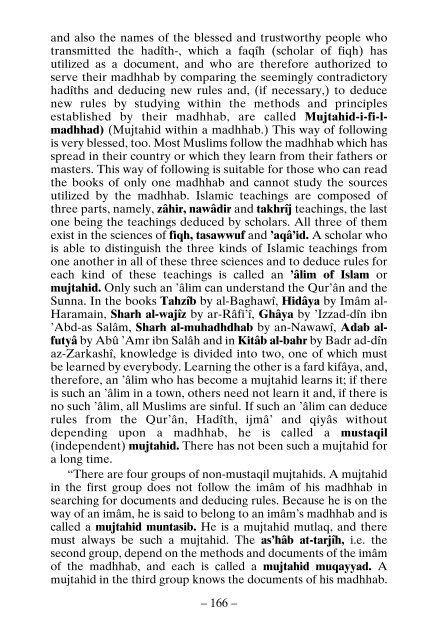Islams Reformers
The bigotry of the religion reformers or bigots of science who surfaced lately to blame all previous scholars, basic fundamental beliefs or practices
The bigotry of the religion reformers or bigots of science who surfaced lately to blame all previous scholars, basic fundamental beliefs or practices
Create successful ePaper yourself
Turn your PDF publications into a flip-book with our unique Google optimized e-Paper software.
and also the names of the blessed and trustworthy people who<br />
transmitted the hadîth-, which a faqîh (scholar of fiqh) has<br />
utilized as a document, and who are therefore authorized to<br />
serve their madhhab by comparing the seemingly contradictory<br />
hadîths and deducing new rules and, (if necessary,) to deduce<br />
new rules by studying within the methods and principles<br />
established by their madhhab, are called Mujtahid-i-fi-lmadhhad)<br />
(Mujtahid within a madhhab.) This way of following<br />
is very blessed, too. Most Muslims follow the madhhab which has<br />
spread in their country or which they learn from their fathers or<br />
masters. This way of following is suitable for those who can read<br />
the books of only one madhhab and cannot study the sources<br />
utilized by the madhhab. Islamic teachings are composed of<br />
three parts, namely, zâhir, nawâdir and takhrîj teachings, the last<br />
one being the teachings deduced by scholars. All three of them<br />
exist in the sciences of fiqh, tasawwuf and ’aqâ’id. A scholar who<br />
is able to distinguish the three kinds of Islamic teachings from<br />
one another in all of these three sciences and to deduce rules for<br />
each kind of these teachings is called an ’âlim of Islam or<br />
mujtahid. Only such an ’âlim can understand the Qur’ân and the<br />
Sunna. In the books Tahzîb by al-Baghawî, Hidâya by Imâm al-<br />
Haramain, Sharh al-wajîz by ar-Râfi’î, Ghâya by ’Izzad-dîn ibn<br />
’Abd-as Salâm, Sharh al-muhadhdhab by an-Nawawî, Adab alfutyâ<br />
by Abû ’Amr ibn Salâh and in Kitâb al-bahr by Badr ad-dîn<br />
az-Zarkashî, knowledge is divided into two, one of which must<br />
be learned by everybody. Learning the other is a fard kifâya, and,<br />
therefore, an ’âlim who has become a mujtahid learns it; if there<br />
is such an ’âlim in a town, others need not learn it and, if there is<br />
no such ’âlim, all Muslims are sinful. If such an ’âlim can deduce<br />
rules from the Qur’ân, Hadîth, ijmâ’ and qiyâs without<br />
depending upon a madhhab, he is called a mustaqil<br />
(independent) mujtahid. There has not been such a mujtahid for<br />
a long time.<br />
“There are four groups of non-mustaqil mujtahids. A mujtahid<br />
in the first group does not follow the imâm of his madhhab in<br />
searching for documents and deducing rules. Because he is on the<br />
way of an imâm, he is said to belong to an imâm’s madhhab and is<br />
called a mujtahid muntasib. He is a mujtahid mutlaq, and there<br />
must always be such a mujtahid. The as’hâb at-tarjîh, i.e. the<br />
second group, depend on the methods and documents of the imâm<br />
of the madhhab, and each is called a mujtahid muqayyad. A<br />
mujtahid in the third group knows the documents of his madhhab.<br />
– 166 –

















